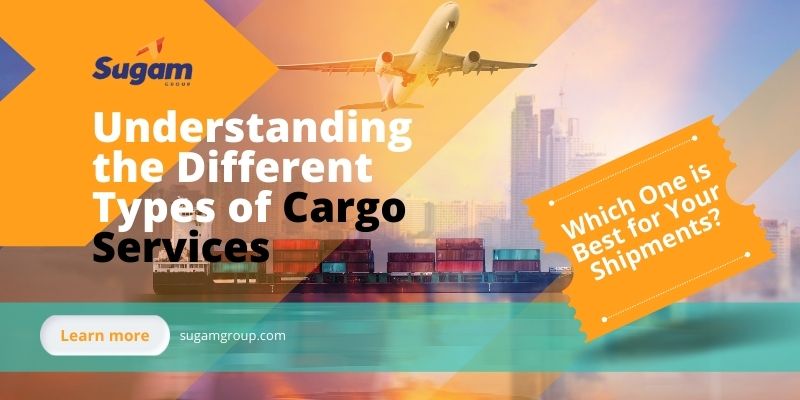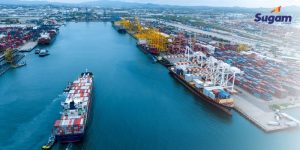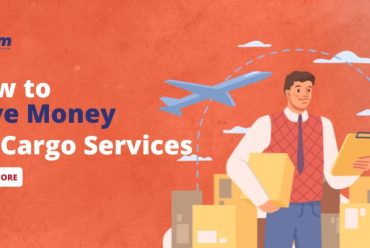Understanding the Different Types of Cargo Services: Which One is Best for Your Shipments?
Transporting goods is a crucial aspect of many businesses, and choosing the right type of cargo service can significantly impact the success of your business. Understanding the different types of cargo services available can help you make informed decisions when selecting a shipping method that fits your budget and shipment requirements. In this blog post, we will provide an overview of each type of cargo service and offer examples of when each is ideal for certain shipments.
Different Types of Cargo Services Available For Your Business
There are several types of cargo services available, including air cargo, sea cargo, road cargo, rail cargo, and intermodal cargo services. Each type of service has its advantages and disadvantages, and knowing the specifics of each one can help you choose the best option for your shipments. Let’s talk about each one of them and how you can select the best cargo services without shipment.
What are Air Cargo Services?
Air Cargo services involve the transportation of goods by airplane. This mode of shipping is known for its speed and reliability, making it an excellent choice for time-sensitive shipments. Air Cargo services can be used for both domestic and international shipments and offer a range of delivery options, including door-to-door and airport-to-airport delivery.
Advantages of Air Cargo Services:
There are several advantages to using air cargo services, including:
- Fast delivery times: Airplanes are capable of traveling long distances quickly, allowing for faster delivery times compared to other modes of transportation.
- Global accessibility: Air Cargo services provide access to almost any destination worldwide, making them an ideal choice for businesses with a global presence.
- Reduced risk of damage: Airplanes are less susceptible to damage from weather conditions, road closures, and other potential delays that may impact other modes of transportation.
Disadvantages of Air Cargo Services:
While air Cargo services offer several advantages, they also have some disadvantages, including:
- Higher cost: Air Cargo services can be more expensive than other modes of shipping, especially for heavy or bulky goods.
- Limited cargo space: Airplanes have limited cargo space, which may limit the type and quantity of goods that can be shipped via air.
- Strict weight and size restrictions: Air Cargo shipments are subject to strict weight and size restrictions, which may impact the type and quantity of goods that can be shipped.
When to Use Air Cargo Services?
Air Cargo services are ideal for time-sensitive shipments, such as perishable goods, pharmaceuticals, and high-value products. They are also useful for urgent shipments, such as replacement parts or emergency supplies, where timely delivery is critical. For example, a company that needs to transport a shipment of fresh produce from one country to another can use air Cargo services to ensure that the goods reach their destination quickly and in good condition.
What are Sea Cargo Services?
Sea Cargo services involve the transportation of goods by sea or ocean-going vessels. This mode of shipping is suitable for goods that are not time-sensitive and can withstand longer transit times.
Advantages of Sea Cargo Services:
There are several advantages to using sea Cargo services, including:
- Lower cost: Sea Cargo services are generally more cost-effective than air Cargo services, making them an ideal choice for businesses with large or heavy shipments.
- Larger cargo space: Ocean-going vessels have larger cargo space than airplanes, allowing for the transportation of bulky or oversized goods.
- Environmentally friendly: Sea Cargo services have a lower carbon footprint than air Cargo services, making them a more sustainable option for businesses.
Disadvantages of Sea Cargo Services:
While sea Cargo services offer several advantages, they also have some disadvantages, including:
- Longer transit times: Sea cargo services are generally slower than air cargo services, with longer transit times that can range from several days to several weeks.
- Limited accessibility: Some destinations may not be accessible by sea, making sea cargo services unsuitable for certain shipments.
- Risk of damage: Goods transported by sea are susceptible to damage from weather conditions, rough seas, and mishandling during loading and unloading.
When to Use Sea cargo services?
Sea cargo services are ideal for goods that are not time-sensitive and can withstand longer transit times. They are suitable for businesses that need to transport large or heavy shipments, such as industrial equipment, furniture, and vehicles. For example, a company that needs to transport a shipment of cars from one country to another can use sea cargo services to save on transportation costs.
What are Road cargo services?
Road cargo services involve the transportation of goods by trucks or other land-based vehicles. This mode of shipping is suitable for goods that need to be transported over short distances or within a country.
Advantages of Road cargo services:
There are several advantages to using road cargo services, including:
- Flexibility: Road cargo services offer a high degree of flexibility, as trucks can reach almost any destination, including those that are not accessible by other modes of transport.
- Speed: Road cargo services are generally faster than sea cargo services, with shorter transit times that can range from several hours to several days.
- Cost-effective: Road cargo services are generally more cost-effective than air cargo services, making them an ideal choice for businesses with smaller shipments.
Disadvantages of Road cargo services:
While road cargo services offer several advantages, they also have some disadvantages, including:
- Limited cargo space: Trucks have limited cargo space compared to airplanes and ocean-going vessels, making them unsuitable for larger or bulkier shipments.
- Weather-dependent: Road cargo services are susceptible to delays caused by weather conditions such as heavy rain, snow, or fog.
- Congestion: Road cargo services can be affected by traffic congestion, which can cause delays and increase transportation costs.
When to Use Road cargo services?
Road cargo services are ideal for goods that need to be transported over short distances or within a country. They are suitable for businesses that need to transport smaller shipments, such as perishable goods or consumer goods. For example, a grocery store that needs to restock its perishable items can use road cargo services to transport the goods from a nearby distribution center.
What are Rail cargo services?
Rail cargo services involve the transportation of goods by trains or other rail-based vehicles. This mode of shipping is suitable for goods that need to be transported over long distances within a country or between countries.
Advantages of Rail cargo services:
There are several advantages to using rail cargo services, including:
- High capacity: Rail cargo services have a high capacity for transporting large and heavy shipments, making them an ideal choice for businesses that need to transport goods in bulk.
- Energy-efficient: Rail cargo services are more energy-efficient than road cargo services, making them a more sustainable option for businesses.
- Lower costs: Rail cargo services are generally more cost-effective than air cargo services, making them an ideal choice for businesses with large shipments.
Disadvantages of Rail cargo services:
While rail Cargo services offer several advantages, they also have some disadvantages, including:
- Limited accessibility: Rail cargo services are limited to specific routes and destinations, which can limit their accessibility for certain shipments.
- Longer transit times: Rail cargo services are generally slower than road cargo services, with longer transit times that can range from several days to several weeks.
- Dependence on infrastructure: Rail cargo services depend on the availability and quality of rail infrastructure, which can cause delays and increase transportation costs.
When to Use Rail cargo services?
Rail Cargo services are ideal for goods that need to be transported over long distances within a country or between countries. They are suitable for businesses that need to transport large or heavy shipments, such as raw materials, chemicals, and heavy machinery. For example, a manufacturing company that needs to transport raw materials from one country to another can use rail cargo services to save on transportation costs.
What are Intermodal cargo services?
Intermodal Cargo services involve the use of multiple modes of transport, such as trains, trucks, and ships, to transport goods from one location to another. This mode of shipping is suitable for goods that need to be transported over long distances and between countries.
Advantages of Intermodal cargo services:
There are several advantages to using intermodal cargo services, including:
- Flexibility: Intermodal cargo services offer a high degree of flexibility, as they can transport goods over long distances and between countries using multiple modes of transport.
- Cost-effective: Intermodal cargo services are generally more cost-effective than air cargo services, making them an ideal choice for businesses with larger shipments.
- Reduced carbon emissions: Intermodal cargo services are more environmentally friendly than other modes of transport, as they rely on trains and ships, which produce fewer emissions.
Disadvantages of Intermodal cargo services:
While Intermodal cargo services offer several advantages, they also have some disadvantages, including:
- Complex logistics: Intermodal cargo services require complex logistics to ensure that the goods are transported efficiently and safely across multiple modes of transport.
- Longer transit times: Intermodal cargo services are generally slower than air cargo services, with longer transit times that can range from several days to several weeks.
- Dependence on infrastructure: Intermodal cargo services depend on the availability and quality of rail, trucking, and shipping infrastructure, which can cause delays and increase transportation costs.
When to Use Intermodal cargo services?
Intermodal cargo services are ideal for goods that need to be transported over long distances and between countries. They are suitable for businesses that need to transport larger shipments, such as electronics, machinery, and clothing. For example, a clothing retailer that needs to transport a large shipment of clothes from one country to another can use intermodal cargo services to save on transportation costs.
Conclusion:
When choosing the best cargo service for your shipments, it’s important to consider factors such as the type of goods being shipped, the destination, budget, and delivery timeframe. In conclusion, businesses should carefully evaluate their shipping requirements and budget to select the best cargo service that meets their needs. By doing so, they can ensure that their goods are transported efficiently and safely, while also reducing transportation costs and improving their bottom line.
Why Choose Cargo Services From Sugam Group?
Being in the industry for 50 years, Sugam Group provides excellence in their logistics services with well established international boundaries of transportation & 3PL solutions across India, Nepal, Bhutan & Bangladesh.
With over 1 Lac customers annually, we have 1,00,000+ sq. ft. area of warehouse space and 250+ offices in SAARC region along with 500+ GPS enabled vehicles.
From warehousing, custom clearance, supply chain, to Full truck load services, Sugam Group has established itself as a one stop solution for all the logistics needed with well versed support and transportation. Our boundaries are expanded into FMCG, Pharmaceuticals, Automobiles, Packaging, Infrastructure & Engineering and more. Our esteemed customers include Dabur, Gillette, Godrej, Cipla, Glenmark, Tata Steel, Bajaj and many other prestigious firms. Choose the logistics services from a reliable support and experience of Sugam Group. If you have any questions, feel free to call 1800112243 or write to us on sales@sugamgroup.com
FAQs:
-
What are the different types of transportation?
There are several types of transportation, including air, sea, road, rail, and pipeline transportation.
-
What are the different modes of transportation?
The different modes of transportation include land, air, and sea transportation. Land transportation includes road and rail transport, while air transportation includes air cargo and passenger transport. Sea transportation includes shipping and port services.
-
What is the cheapest means of transport?
The cheapest means of transport depends on the type of cargo, distance, and urgency. Generally, sea and rail transportation are the cheapest means of transport for larger shipments, while road transportation is the cheapest for short distances.
-
What is the slowest means of transport?
Sea transportation is generally the slowest means of transport, as ships travel at slower speeds than other modes of transportation.
-
Which is the cheapest means of transport?
The cheapest means of transport depends on the type of cargo, distance, and urgency. Generally, sea and rail transportation are the cheapest means of transport for larger shipments, while road transportation is the cheapest for short distances.
-
What are the 5 types of cargo?
The five types of cargo are dry bulk, liquid bulk, containerized, project, and breakbulk cargo.
-
What are types of cargo services?
The types of cargo services include air Cargo , sea Cargo , road Cargo , rail Cargo , and intermodal cargo services. Each type of cargo service offers its own advantages and disadvantages and is suitable for different types of cargo and transportation requirements.












No Comments